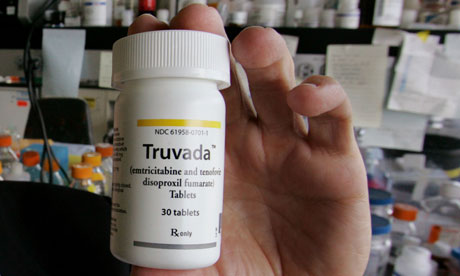
A once-daily pill can protect men at high risk of HIV from becoming infected, a ground-breaking study shows today.
The international trial, which has generated much excited anticipation, provides proof for the first time that pills used to treat HIV/Aids can also prevent it. Campaigners greeted the results, published today in the New England Journal of Medicine, with enthusiasm, suggesting that they could fundamentally change the approach to preventing HIV in some groups of people.
The findings are good news for men who have sex with men, the population in whom the drugs were tried. There were 43.8% fewer HIV infections among those who took Truvada, the once-a-day tablet containing two drugs, emtricitabine and tenofovir, than among those who did not. The protective effect was much greater in those who took the tablets consistently: it reduced the risk of those who took it 90% or more of the time by 72.8%.
But Aids experts warned gay and bisexual men and their doctors that drugs did not offer an instant and easy answer. Protection was low in those who did not take them regularly. The Centres for Disease Control in the United States issued guidance that pre-exposure prophylaxis "should never be seen as the first line of defence against HIV". Men who participated in the trials were counselled to use condoms, reduce their number of sexual partners and get tested and treated for other sexually transmitted diseases which can increase the risk of HIV infection.
The big unanswered question is whether drugs can also prevent infection in other at-risk groups, such as women in sub-Saharan Africa whose partners will not use condoms, and drug users. The study showed the pill is protective in sex between men, but it does not follow that drugs would protect during heterosexual sex, where the route of transmission is different.
Other studies are under way in heterosexual couples and in injecting drug users, however, and there is some reason for hope. One of the drugs used in this trial, tenofovir, has been shown to prevent some HIV infection in women when it is applied to the vagina as a gel before sex.
Dr Kevin Fenton, director of the CDC National Centre for HIV/AIDS, Viral Hepatitis, STD and TB Prevention, said the results "represent a major advance in HIV prevention research ... Given the heavy burden of HIV among gay and bisexual men, a new tool with potential additive benefit is exciting and welcome news."
The findings provided hope that prophylactic drug treatment could protect other at-risk groups around the world. "Given the continued severity of the HIV epidemic, safe and effective new approaches are urgently needed for all populations at risk," he said.
Aids campaigners called for swift action on the findings. More clinical research is needed, said Chris Collins, the vice president of Amfar (the Foundation for Aids Research), "but given the severity of the MSM epidemic, we also need to move forward with implementation studies that can assess adherence, safety, and the potential to impact HIV incidence".
He and the CEO, Kevin Frost, hoped that the findings would help make the case for continuing high levels of Aids research in spite of the economic downturn. "If we're serious about controlling this epidemic, we need to continue to make those investments," said Frost.
The study was carried out by the independent Gladstone Institute on behalf of the US National Institutes of Health in six countries: Brazil, Ecuador, Peru, South Africa, Thailand and the United States. Nearly 2,500 men and transgender women who have sex with men and were at high risk of HIV infection took part in the study which began in 2007. Half the volunteers were given Truvada and the others were given a dummy pill.

